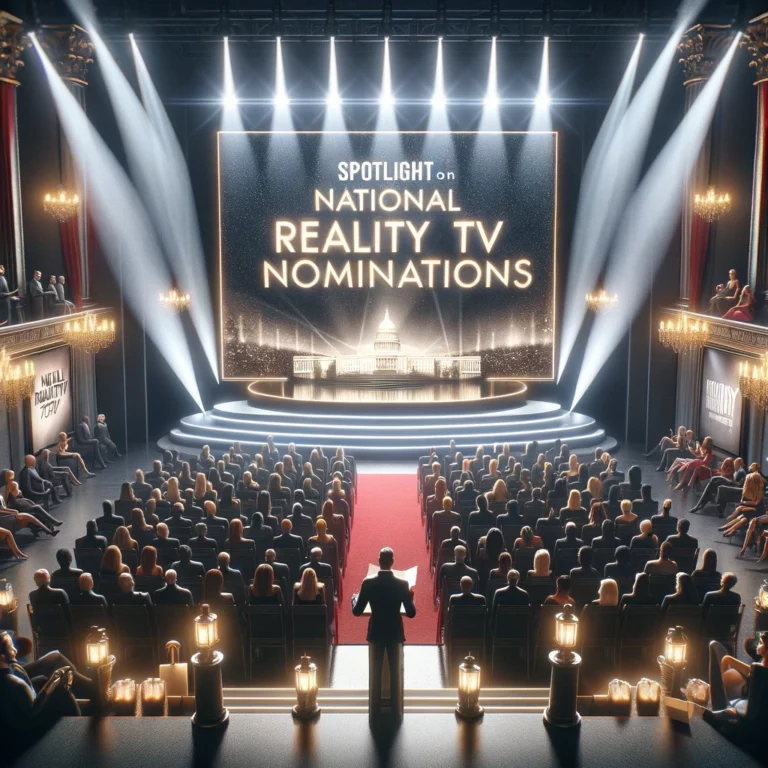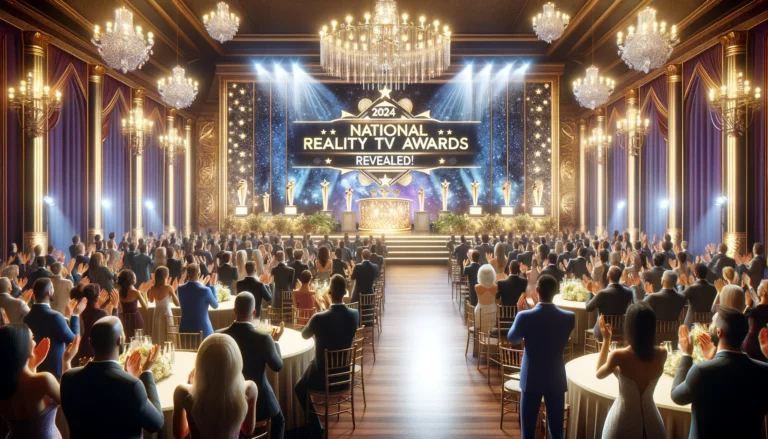The Impact and Influence of the National Reality TV Awards on Pop Culture
Understanding the Phenomenon of Reality Television
Reality Television has become an integral part of global pop culture, captivating millions of viewers with its unique blend of unscripted drama, real-life situations, and often unpredictable outcomes. This genre has introduced a plethora of shows that range from cooking contests to survival challenges, dating games to talent hunts. Shows like “The Bachelor,” “Survivor,” “American Idol,” and “Big Brother” have not only gained immense popularity but have also significantly influenced societal norms and expectations. Transitioning into the second decade of the 21st century, reality television continues to evolve and exert influence on pop culture dynamics. The advent of social media has amplified this impact further by providing a platform for continuous engagement between viewers and participants. Reality stars often gain substantial social media followings, becoming influencers in their own right. They set trends in fashion, language, lifestyle choices, and even political views. It is undeniable that reality TV has transcended beyond mere entertainment to become a significant force in shaping public discourse. The National Reality TV Awards (NRTA) plays a pivotal role in acknowledging the impact of these shows and their participants. It celebrates outstanding performances and contributions within the genre, thus boosting the popularity of these programs further. More importantly, it legitimizes reality television as an influential component of mainstream media. Although it does not mark the end of traditional scripted programming, the NRTA’s recognition underscores how our viewing habits have shifted towards more raw, authentic content that mirrors our everyday life experiences. Without explicitly saying so, it is clear that reality television’s influence on pop culture is here to stay.

The Significance of Prestigious TV Awards
The National Reality TV Awards (NRTA) has a significant role in the reality TV landscape. By honoring exceptional performances and contributions within this genre, it amplifies the importance and influence of reality television on popular culture. The NRTA is not merely an awards ceremony; it’s a celebration of the diverse array of shows that have captivated audiences worldwide. This recognition contributes to the growing credibility and acceptance of reality TV as a form of entertainment that is just as valid and influential as traditional scripted programming. Moreover, winning an award at the NRTA can catapult contestants into prominence, providing them with opportunities to become influencers or embark on new careers in mainstream media. This further extends the reach and impact of reality TV on pop culture. For example, many previous winners have gone on to host their own shows, act in films, or initiate successful fashion lines. Therefore, these awards can serve as a stepping stone for individuals seeking to make their mark beyond the realm of reality television. Beyond individual accolades, these prestigious awards also contribute to shaping viewer preferences and trends in pop culture. As award-winning shows gain more visibility, they often set trends in terms of content themes and presentation styles. They influence what viewers want to see more of on their screens – be it cooking competitions, talent quests or survival challenges. Hence, by recognizing excellence within this genre through awards like the NRTA, we indirectly dictate future directions for reality television programming without even realizing it.
Tracing the Growth and Popularity of Reality Shows
Reality television has seen exponential growth since its inception. It started as an experimental concept and has now become one of the most popular genres in broadcasting. This popularity is attributed to several factors, but a key reason for its wide appeal is its ability to mirror real-life situations and emotions that viewers can relate to, which differ greatly from scripted programming. The National Reality TV Awards (NRTA) has played a crucial part in this evolution by acknowledging and promoting shows that excel in this genre. The NRTA’s influence can be traced through the increasing number of reality shows being produced each year, coinciding with their rise in popularity. Shows that have been recognized or awarded by the NRTA often enjoy higher ratings and increased viewer engagement. This recognition not only validates the quality of these programs but also bolsters their reputation among viewers and within the industry. Consequently, more producers are eager to create reality shows, knowing there is a prestigious award up for grabs that could potentially boost their show’s success. It’s worth noting how reality TV shows have transformed from being mere entertainment into cultural phenomena due to their profound impact on pop culture. They influence fashion trends, popularize catchphrases, and even inspire societal conversations around diverse topics such as mental health or race relations. By highlighting these shows through awards like the NRTA, we’re not just celebrating entertaining television content; we’re also acknowledging the wider cultural implications these shows carry within our society today.
How TV Awards Shape Public Perception and Taste
Undeniably, TV awards like the National Reality TV Awards (NRTA) play a significant role in shaping public perception and taste. When a reality show garners an award from such a prestigious institution, it sends a strong signal to viewers that this particular program stands out among its peers. Viewers tend to gravitate towards these award-winning shows, trusting the judgment of industry experts and critics. This pattern then creates a cycle where popular shows receive awards, which further boosts their popularity among the public. Moreover, these awards can also shape viewer preferences by defining what constitutes good quality in this genre. For instance, if a reality show with a unique format or challenging themes receives recognition from the NRTA, it may inspire viewers to explore similar programs outside their usual comfort zones. Consequently, this broadens the scope of what audiences might find appealing in reality television. The NRTA’s influence extends beyond just validating popular trends; it also has the power to introduce innovative concepts and push boundaries within the genre. The shaping of public perception goes hand-in-hand with fostering critical thinking about television content. With increasing attention on award-winning reality shows, audiences are encouraged to dissect why certain programs are deemed superior by industry standards. This prompts discussions about storytelling elements, production quality, and even societal issues highlighted in these shows. Therefore, while TV awards like NRTA amplify viewer engagement with awarded shows, they also stimulate deeper reflections on what makes compelling and socially relevant television today – without necessarily drawing conclusions or having final say on the matter.
The Power of Celebrating Reality Stars on Pop Culture
Recognizing the contribution of reality stars is an important aspect of the National Reality TV Awards. These awards carry a significant cultural weight as they not only celebrate the actors but also their shows. This recognition propels reality stars into the limelight, making them household names and trendsetters in popular culture. Their fashion choices, lifestyle habits, and even personal beliefs often set trends that fans follow, leading to a ripple effect on consumer behavior and societal norms. In addition to shaping consumer trends, celebrating reality stars can impact pop culture by normalizing previously niche or marginalized perspectives. When diverse personalities and experiences are celebrated on such a public platform, it sends a message of acceptance and inclusivity to viewers. For example, if an LGBTQ+ reality star is recognized for their work, it can help challenge heteronormative narratives in mainstream media. Similarly, honoring individuals from different racial backgrounds can promote multiculturalism and combat stereotypes. Furthermore, these awards have a profound impact on aspiring television artists by providing role models for them to emulate. By acknowledging the achievements of reality stars who have broken through various barriers – be it race, gender or socio-economic status – NRTAs inspire those dreaming of a career in television. They show that success is possible regardless of your background and that talent and hard work are truly valued in this industry. Therefore, while these awards may seem solely focused on entertainment value at first glance, they play a crucial role in shaping societal attitudes and aspirations too.
Examining the Influence of Award-Winning Reality Shows on Viewership Trends
In the realm of television, reality shows hold a significant portion of viewership. The shows that bag awards at NRTAs often experience a surge in their popularity and viewership. This is largely due to the heightened visibility and publicity that come with winning an award. The recognition serves as an endorsement of the show’s quality, encouraging more people to tune in and watch. In this way, the NRTAs can directly influence viewing trends, steering audiences towards certain shows and potentially away from others. Moreover, these awards also indirectly shape audience preferences by setting benchmarks for what constitutes good reality TV. When a particular show clinches an award, it is essentially being acknowledged for its excellence in content, production value, or its unique approach to reality television. This sets a standard for other reality TV shows to aspire towards while also informing viewers about what they should expect from high-quality reality television. Consequently, this can lead to increased demand for well-produced and innovative content within the genre. The influence of award-winning reality shows goes beyond just dictating what audiences watch; it can also impact how they perceive certain subjects or issues addressed in these shows. For instance, if a show focused on environmental conservation wins an award, it may not only boost viewership numbers but could also raise awareness about sustainability among its audience. Similarly, if a show that breaks traditional gender norms gets recognized at the NRTAs, it might contribute towards challenging sexist ideologies within society. Thus, through their influence on viewership trends and public consciousness alike, award-winning reality shows play a critical role in shaping popular culture.
Reality TV Awards as a Driving Force for Cultural Trends
The National Reality TV Awards (NRTAs) do not just influence television viewing patterns; they also have a profound impact on shaping cultural trends. This is partly because reality television, as a genre, often reflects and capitalizes on existing social phenomena. By awarding certain shows, the NRTAs effectively endorse these trends, making them more prominent within mainstream culture. Consider for example when reality TV delves into unconventional themes or lifestyle choices outside of societal norms. When such shows receive recognition at the NRTAs, it lends legitimacy to these alternative perspectives and propels them further into the public eye. In this way, the NRTAs can serve as a catalyst for new cultural trends, helping to normalize diverse ways of living and thinking in society. Beyond endorsing existing trends, the NRTAs can also play a role in challenging outdated societal norms. When shows that tackle important social issues or promote progressive values are honored with an award, it sends out a powerful message to viewers and society at large. This recognition can spark conversations around these issues and inspire changes in attitudes and behaviors. However, it’s essential to remember that while the NRTAs have considerable cultural influence, they are part of a broader ecosystem of factors driving societal change.
The Role of Winning a Major TV Award in Boosting Show Ratings
One of the most immediate and noticeable impacts of the National Reality TV Awards (NRTAs) on popular culture is the boost they provide to the ratings of winning shows. The award acts as a seal of approval, drawing attention to these programs and encouraging more viewers to tune in. This effect is not only limited to national audiences but also spreads internationally, thanks to the global reach and influence of reality television. Consequently, winning an NRAT can significantly increase a show’s visibility and viewership, both domestically and abroad. This surge in popularity often translates into greater advertising revenue for networks airing these reality shows. Advertisers are more likely to invest in shows with high ratings due to their substantial viewer base, thus ensuring a wider audience for their products or services. Furthermore, it creates a ripple effect within the industry itself; other producers and networks are motivated to create similar content in hopes of replicating this success. However, it’s important to note that while an NRAT win can help boost ratings temporarily, maintaining those numbers requires consistent quality content that resonates with viewers. Award wins can bring in new viewers initially, but it’s engaging stories and compelling characters that keep them tuning in week after week. Thus, while the awards play a crucial role in spotlighting deserving shows and propelling them into mainstream consciousness, long-term success ultimately depends on much more than just accolades.
Exploring the Connection between Award Recognition and Cultural Shifts
The National Reality TV Awards (NRTAs) not only boost show ratings but they also have a profound influence on cultural shifts. These awards, by recognizing and promoting particular themes, trends, or narratives within reality TV shows, can subtly shape public opinion and societal norms. For instance, a series that promotes diversity and inclusivity might win an NRAT for its groundbreaking content. This recognition attracts more viewers who are then exposed to these progressive ideals, thereby encouraging broader acceptance and understanding in society. Moreover, the NRTAs also play a vital role in defining what is popular or trendy at a particular time. By awarding shows that feature specific themes or concepts, they inadvertently endorse those elements as culturally relevant and desirable. This can lead to an increased prevalence of similar themes across other television genres and even in areas beyond entertainment like fashion or lifestyle trends. In this way, these awards contribute to shaping the cultural zeitgeist. Without drawing definitive conclusions from this connection between award recognition and cultural shifts, it’s clear that the impact of the NRTAs extends far beyond mere entertainment. They serve as catalysts for change by spotlighting innovative content and progressive themes which can stimulate dialogues on societal issues or challenge prevailing stereotypes. While their primary goal may be to celebrate excellence in reality television, their influence inevitably permeates into wider spheres of society leading to subtle but significant cultural shifts over time.
Assessing the Long-term Impact of Acclaimed Reality Shows on Popular Culture
To fully appreciate the long-term impact of acclaimed reality shows on popular culture, one must first understand the pervasive nature of these programs. Reality television, by design, reflects everyday life and societal norms to a certain extent. When a reality show garners critical acclaim at platforms like the NRTAs, it gains a larger audience that extends beyond its initial viewer base. This expanded reach allows the messages, themes or narratives promoted by these shows to infiltrate deeper into people’s consciousness. Moreover, reality TV’s influence is not confined within the timeframe of their broadcast period. The ripple effects continue to echo in pop culture long after a season has ended. For instance, consider catchphrases from famous reality TV personalities that persist in popular vocabulary years after they were first uttered on screen. Similarly, lifestyle trends inspired by these shows – be it fashion choices or dietary habits – often outlive the show’s run time and become ingrained elements of contemporary culture. The NRTAs, by recognizing such influential content, contribute indirectly but crucially towards shaping this cultural landscape. In measuring this long-term impact of acclaimed reality shows on popular culture, it’s essential to account for both tangible and intangible influences. Tangible changes may include shifts in fashion trends or increased interest in certain activities featured on these shows. Intangible impacts could manifest as changed perspectives or attitudes towards social issues tackled in these series. The role played by platforms like the National Reality TV Awards in amplifying such influential content cannot be overstated; their recognition serves as an affirmation of relevance and appeal which can lead to more sustained cultural shifts over time.




